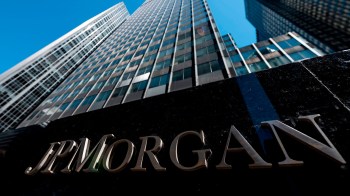Investing in sustainability: Banks get a green thumb
David Brancaccio: This week, Bank of America promised to spend $50 billion over ten years to invest in renewable energy and alternative transportation. Goldman Sachs and Wells Fargo now have big green pledges as well. The New York Times suggests this a way for Wall Street to burnish its tarnished image. But here is an additional explanation: maybe the giants are following the lead of a small bank in San Francisco that’s been doing what it calls “Planet Smart” banking for years.
Vincent Siciliano is President and CEO of New Resource Bank. Mr. Siciliano, good morning.
Vincent Siciliano: Good morning to you.
Brancaccio: Help me understand, you’re building an organic, hormone-free, non-GMO, bank?
Siciliano: Well I would say that we are building a bank that takes a broader look at business and society and tries to integrate our values into what we do.
Brancaccio: So if a potential customer feels they are sick and tired with their traditional bank and they come to you and put some money on deposit, how might you use it in a different way?
Siciliano: Well we have a number of sectors, so for example the area that we call clean technology would include companies that involved in solar energy, energy efficiency — that would be an area that we are quite involved with. We work with a lot of non-profits, we also work with real estate that is building buildings in a different way.
Brancaccio: That’s the real power of an institution like yours. You can give people loans and you can decide in which direction to direct them and you wanted to business with people who are thinking longer term.
Siciliano: Yes, I think one of the problems in our system is that we discount everything, we discount the future to the present and that very quickly removes any real value of the future when we are making our decisions now and we have to get away from that. I understand the economic need to look for appropriate financial returns, but we can’t pretend that the future of our grandchildren has no value today.
Brancaccio: Smaller banks unfortunately have not been immune from the effects of the banking crisis, does your size make you, do you think, more vulnerable to financial shocks or the continued, what should we call it, brittle-ness of the U.S. economy?
Siciliano: Well, right now frankly, we are seeing pretty strong loan demand. The Bay Area is doing pretty well both because of its technology base but also because there is a strong interest in companies that are managing from a more sustainable perspective. We think that in the long run we are going to see companies that are more resilient to economic shocks that are more attractive to employees, that have a better brand value. So, I think we are beginning to see that unfold already, that sustainably minded businesses are going to do better.
Brancaccio: Vince Siciliano, President and CEO of New Resource Bank in San Francisco, thank you very much.
Siciliano: Thank you very much.
There’s a lot happening in the world. Through it all, Marketplace is here for you.
You rely on Marketplace to break down the world’s events and tell you how it affects you in a fact-based, approachable way. We rely on your financial support to keep making that possible.
Your donation today powers the independent journalism that you rely on. For just $5/month, you can help sustain Marketplace so we can keep reporting on the things that matter to you.


















